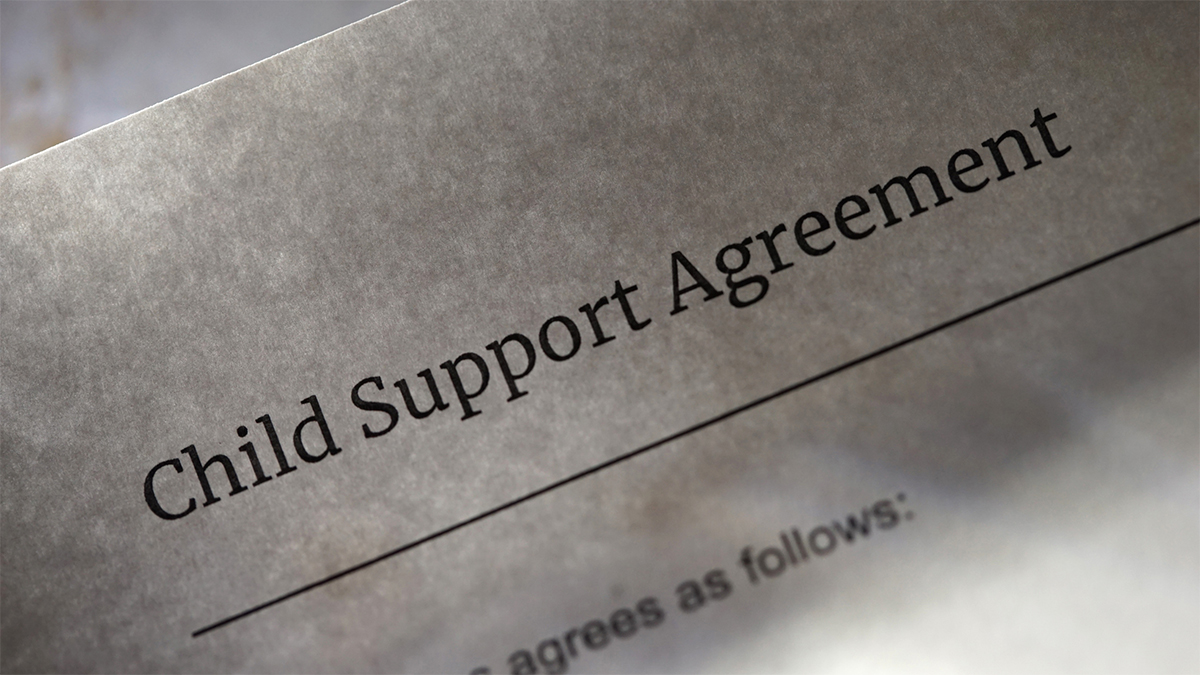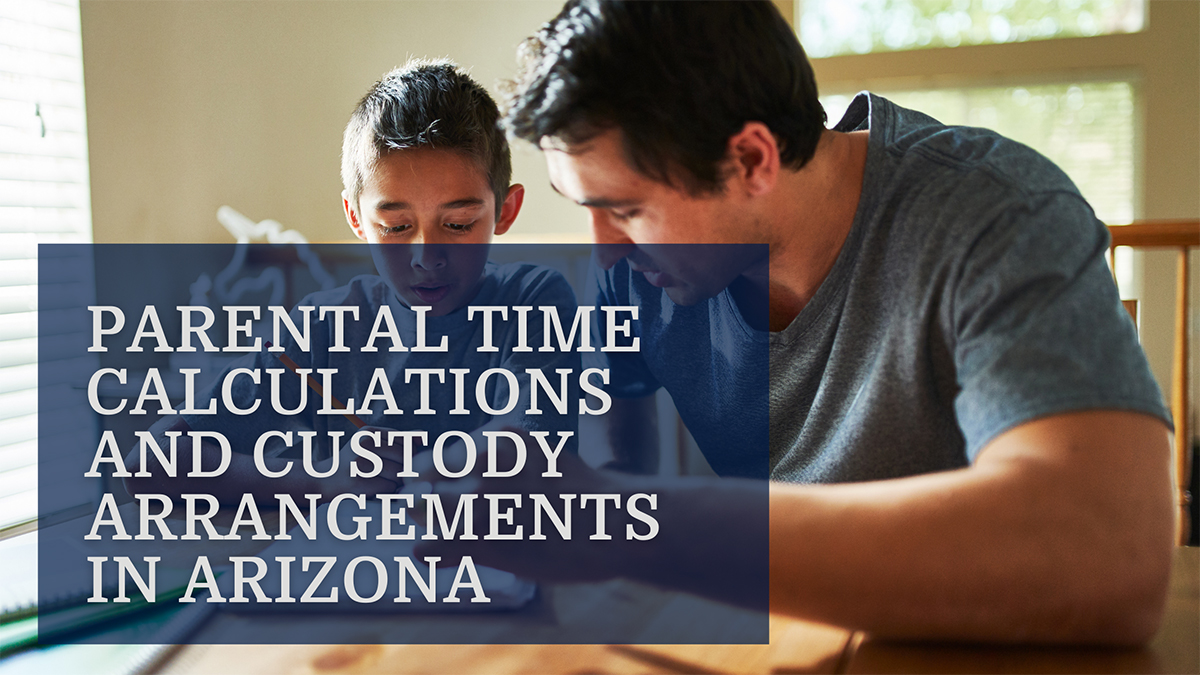Table of Contents
- How Is Child Support Calculated in Arizona?
- What Can You Do if Your Child’s Other Parent Does Not Make Child Support Payments?
- Penalties for Unpaid Child Support
- Arizona Child Support Arrears Forgiveness
- Modifying Child Support
- What Factors Do Not Qualify You for Relief of Child Support?
- Child Support Arrears and Parenting Time
- Why Secure an AZ Child Support Lawyer?
- Arizona Child Support FAQs
While navigating a divorce, many different things must be decided between you and your soon-to-be-ex-spouse. While the division of assets can become difficult and complicated, child custody is often the most contentious matter to resolve. In addition, child support is often difficult to negotiate and, at times, enforce.
A 2018 Census report stated that approximately two thirds of custodial parents received partial child support payments, while less than half of custodial parents received full payments. Unfortunately, the state of Arizona ranks as the nation’s fifth highest in unpaid child support, with Hawaii claiming the number one spot only a few percentage points higher.
When someone fails to pay child support, their life and the lives of their children can be greatly impacted. The children may not see the financial strain from their custodial parent, but they may experience the resulting stress. The parent who is failing to pay may see a contempt of court charge, as well as criminal or civil penalties and possible jail time.
How Is Child Support Calculated in Arizona?
In general, child support is calculated based on several different factors that are primarily income-based but may also account for parenting time. The goal of the courts is to decide what is best for the children and to maintain the comfort level and current lifestyle for the children involved. Throughout this process, determining child support can be a trying situation for both parties.
The Income Share Model
Child support is calculated in a unique way in the state of Arizona, based on an “income share model.” What this means is that children should receive the same monetary benefit they would gain if their parents were still residing under the same roof. Typically, the courts will attempt to meet the needs of the child or children the same they were prior to the separation or divorce. While the courts ultimately have the power to decide to diverge from the calculated amount if it seems unfair or unjust, child support is typically based on this calculated model derived from income and parenting time.
Because Arizona calculates parenting time uniquely, it’s important to understand the system before pursuing Arizona child support. Any parenting time between 12-24 hours is considered a full day. Meanwhile, 6-11 hours is equal to a half a day and 3-5 hours is a quarter of a day.
Child support must begin when a separation or divorce takes place, and ends under the following conditions:
- A child reaches 18 years of age
- If the child reaches 18 years and is still attending high school, the payment period ends upon graduation
- A child has not graduated high school, but reaches 19 years of age
Determining Gross Income
Determining gross income is an important next step in determining child support payments. Gross income includes most of the ways a parent can earn money. This can include:
- A wage or salary earned from employment
- Bonuses or commissions earned from employment
- Severance pay
- Dividends
- Workers’ compensation or Social Security
This amount wouldn’t include any additional income earned through overtime unless the overtime is “historically earned” and part of income earned based on a regular schedule. For instance, a mine worker may work four 12-hour shifts a week as a part of a regular schedule. This overtime would be considered “historically earned.”
Deviations from the AZ Child Support Calculator
While child support in Arizona typically falls within the range suggested by the AZ Child Support Calculator, it is possible to deviate from those calculations. For example, child support can reach a maximum amount. The courts will consider up to $2,000 monthly income earned collectively, for up to six children.
Parents can also choose to diverge from the Arizona Child Support Calculator that is typically used. This can be done either in court or during a mediation. However, certain parameters must be met for the courts to agree to a deviation:
- Usage of the child support calculator is considered unfair or unjust
- Diverging from the calculator better considers what is in the best interests of the child or children
- The parents or court submit written details for diverging
- The amount that would have been suggested prior to deviating is disclosed
- The amount suggested after the deviation is disclosed
What Can You Do if Your Child’s Other Parent Does Not Make Child Support Payments?

Once the amount for child support has been determined, it is up to the proper party to pay that support. However, if a parent fails to make child support payments, a lawyer can begin the process of seeking the outstanding balance with interest. The first step in the process is to file a petition for contempt.
Once this petition is filed, the court will issue a decree to appear and arrange a time for a contempt hearing. The other parent must be served with the order to appear before the court for the contempt hearing, as well as the petition for contempt. The petitioning party will also need to appear before the court on the scheduled day.
In the event the other parent does not attend the hearing, the contempt proceedings can continue without their presence. Should they choose not to show up for the hearing, they’ll likely be found in contempt and must face legal consequences.
It’s important to ensure you have sufficient proof that the other party was aware of the child support order and willfully chose to not pay the ordered amount. A skilled Arizona child support lawyer can help you demonstrate this proof before the courts.
Penalties for Unpaid Child Support
When a parent is held in contempt for their failure to pay the ordered child support, they may face several different consequences. Perhaps most significantly, they may face jail time. Other penalties that may be ordered by the court include:
- Driver’s license suspension
- Professional license suspension
- Liens on personal property
- Bank account seizure
- Garnishment of worker’s compensation benefits
- Credit bureau reporting
Failing to pay child support is a serious crime in the state of Arizona, called “failure of parent to provide for child.” As a class VI felony, a guilty party may see up to 1.5 years in prison. If the amount of back child support is not sufficient for the non-paying parent to be convicted of a felony, they may be convicted of a misdemeanor and receive up to six months of jail time and a $2,500 fine. Finally, those who have committed severe child support evasion may be placed on a list of wanted child support evaders, hosted by the Arizona Department of Economic Security.
Arizona Child Support Arrears Forgiveness
The courts recognize that circumstances can occur that can make a non-custodial parent unable to make their child support payments. When a parent finds themselves with past due child support payments, they are considered “in arrears.” The Arizona Division of Child Support Services offers various programs to assist with past due child support.
The first program exists for those who have earned a GED or diploma. They may see a reduction in their back owed payments of up to $1,000. The second is the DCSS Hardship Program. Some who have seen circumstances that permanently affect their capability of making child support payments may qualify for this program. The third is a settlement program. In this circumstance, the owing parent may pay a lump sum or pay in portions for up to three months.
Modifying Child Support
If financial circumstances changed significantly for either parent, they may pursue a child support modification to create a new agreement that better fits their current financial situation. For a new child support amount to be approved by the court and agreed upon by both parties, the parent must demonstrate proof of this change. A significant change in circumstances could include:
- A new relationship that results in a child
- Parenting time decreasing or increasing
- A new job resulting in a 15% increase or decrease in wages
- A child aging out of support while other children remain
In any of these circumstances, a court may find it appropriate to modify the child support order. If changes to a parent’s income, parenting time, or both result in the need for a new agreement, proof can be demonstrated to the Arizona family court.
What Factors Do Not Qualify You for Relief of Child Support?
Arizona courts consider child support payments first, and they are more important than any other debts incurred. As a result, a parent may not acquire debt in order to be relieved of their obligation to a child support order. Voluntarily accrued debts, be they for new asset acquisition or otherwise, may not factor into the “significant and lasting changes” that the state of Arizona takes into account when child support modifications are calculated. As the child support payment is considered the most important factor, the parent is bound by duty to pay it regardless of any other personal financial choices.
A new marriage of the custodial parent doesn’t alleviate the non-custodial parent from their child support obligations, either. The new spouse has no duty to support the child, and therefore child support should continue regularly, even after a new marriage. However, the custodial parent may move to appeal child support payments.
Child Support Arrears and Parenting Time
Though a parent may not be meeting their child support agreement amounts, that doesn’t entitle the custodial party to withhold parenting time. Because parenting time and child support are viewed as separate legal decisions in Arizona, the non-custodial parent cannot stop paying child support if they’re not receiving their parenting time. In both cases, the actions are unlawful, and the at-fault parties may see penalties.
Why Secure an AZ Child Support Lawyer?
A child support agreement is an important part of any divorce decree or parenting agreement. It holds the non-custodial parent financially responsible for providing for their children as they would have during a relationship with the child’s other parent. To Arizona Family Court, the most important consideration is what’s in the best interest of the child or children.
However, unpaid child support can also put a major burden on the custodial parent. Similarly, a parent who is unable to make payments due to a significant change in circumstances may also experience an insurmountable burden. Regardless of whether you need to secure payments from your child’s other parent or are having a difficult time making your child support payments, a skilled child support attorney can help you provide for your children under Arizona child support laws.
Arizona Child Support FAQs
What Happens if You Don’t Pay Child Support in Arizona?
If you miss child support payments, you may see hefty penalties, including fines, jail time, wage garnishment, and disruption of licensure and other benefits.
Can You Go to Jail for Not Paying Child Support in Arizona?
Not only could you see jail time of up to 6 months, but you may also see prison time of up to 1.5 years if you are in significant arrears with your child support payments.
How Far Behind in Child Support Before a Warrant Is Issued in Arizona?
Once the owing parent is 30 days behind in payments, the custodial parent may file a petition for contempt. The owing parent will be required to appear in court, and if they fail to do so, they will very likely be found in contempt and may see jail time and/or fines.
How Can I Report Someone Not Paying Child Support?
If your child’s other parent is not paying court-ordered child support, you must begin the reporting process by filing a petition for contempt with the courts. After this point, the parents can experience serious penalties.
How Can You Enforce Child Support in Arizona?
If the owing parent is past due on child support payments by 30 days, the custodial parent may file a petition for contempt. This will begin the process to enforce child support payments.

Keep reading to learn more about Parental Time Calculations and Custody Arrangements in Arizona
Resources:
- US Census Bureau (2021). 44% of Custodial Parents Receive the Full Amount of Child Support. U.S. Census Bureau Newsroom. Retrieved April 28, 2022, from https://www.census.gov/newsroom/press-releases/2018/cb18-tps03.html
- Suriano, J. (2018, March 21). Arizona falls short paying child support; evaders owe nearly $2 billion. El Inde Arizona. Retrieved April 28, 2022, from https://indearizona.com/arizona-falls-short-paying-child-support-evaders-owe-nearly-2-billion/
- Arizona Supreme Court (2022). Child Support Guidelines. Arizona Judicial Branch. Retrieved April 28, 2022, from https://www.azcourts.gov/familylaw/Child-Support-Guidelines
- Arizona Supreme Court (2022). Child Support Guidelines. Arizona Judicial Branch. Retrieved April 28, 2022, from https://www.azcourts.gov/familylaw/Child-Support-Guidelines
- AZ DES (2022. Wanted Child support Evaders. Arizona Department of Economic Security Resource. Retrieved April 28, 2022, from https://des.az.gov/services/child-and-family/child-support-services/wanted-child-support-evaders
- Parents Who Pay Child Support | Arizona Department of Economic Security. (n.d.). Arizona Department of Economic Security. Retrieved April 28, 2022, from https://des.az.gov/services/child-and-family/child-support/parents-who-pay-child-support

Ryan Reppucci, Founder/Director of Legal Operations of The Valley Law Group, is recognized as one of Phoenix’s leading family law attorneys. After graduating from Arizona State with the highest honors and inclusion in America’s most prestigious student honor societies, Ryan attended the University of Detroit Mercy School of Law. His career as a law student was decorated with numerous awards, including the University of Detroit Mercy School of Law Book Award, nomination for membership in Who’s Who Among Students in American Colleges and Universities, as well as Moot Court.

